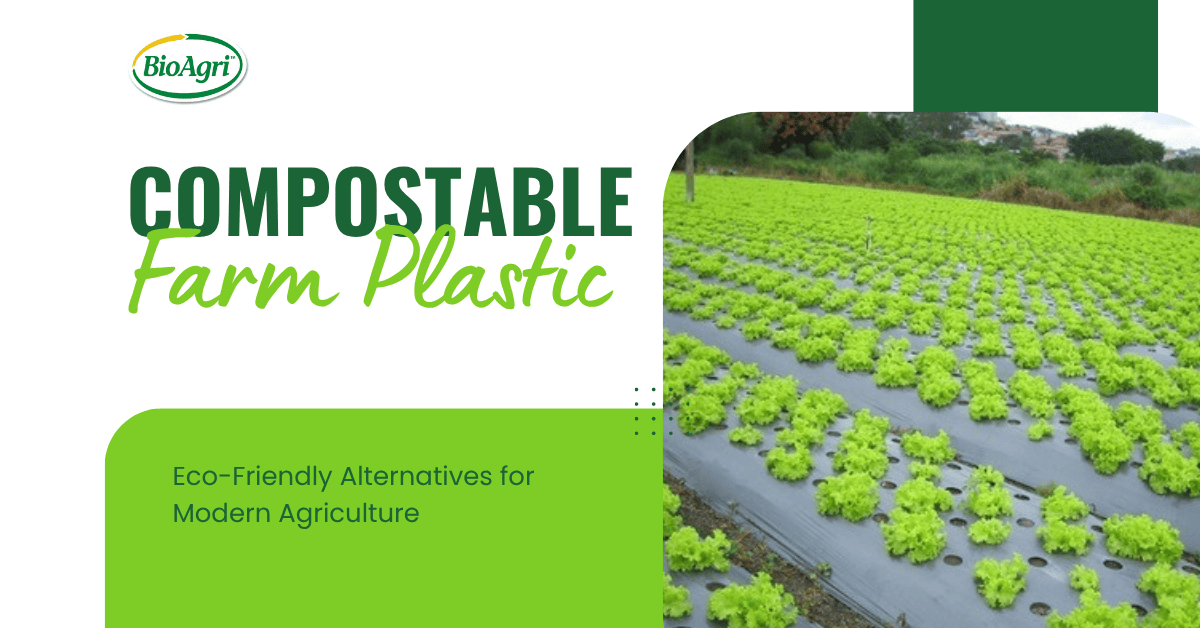Top 5 Reasons to Choose Compostable Farm Plastic

The use of plastic in agriculture has become widespread, especially for applications such as mulch films, seedling trays, tunnel covers, and bale wraps. However, this convenience has come with a significant environmental cost. Traditional plastics often end up in landfills or scattered across farmland, contributing to long-term soil contamination and plastic pollution.
Compostable farm plastic is a sustainable alternative gaining traction in agriculture. Designed to break down naturally, it reduces waste, supports soil health, and fits well within organic and regenerative farming systems. If you are a grower looking to reduce your environmental impact while streamlining operations, this guide outlines the top 5 reasons to choose compostable plastic for your farm.
Understanding Compostable Farm Plastic
Before diving into the benefits, it is important to understand what compostable plastic actually is and how it differs from other types of plastic.
Compostable plastics are made from bio-based materials such as cornstarch, PLA (polylactic acid), and other natural polymers. These materials are designed to degrade under composting conditions either in the field for certain products or in industrial composting facilities. Unlike biodegradable plastics, which may break down into microplastics, compostable plastics leave behind non-toxic organic matter that benefits the soil.
You will find compostable farm plastic in a range of forms from mulch films to silage wraps and seedling pots. Many of these products carry certifications such as the AS 4736 standard, which is a compostability certification or internationally recognised standards. These certifications assure users that the product meets recognised standards for compostability. When shopping for these materials, look for labels that confirm you are buying a certified film to ensure proper degradation and environmental safety.
1. Reduces Plastic Waste on Farms
One of the most compelling reasons to switch to compostable farm plastic is the dramatic reduction in on-farm waste. Traditional polyethylene mulch films must be manually removed and sent to landfill or recycling centres, often contaminated with soil and debris, making proper disposal expensive and difficult.
In contrast, compostable plastics can be left in the field to naturally decompose, depending on the product, or can be collected and sent to industrial composting. It eliminates the burden of collecting, cleaning, and transporting used plastic, which not only saves money but also significantly lowers a farm’s environmental footprint.
2. Improves Soil Health
Traditional plastic films can leave microplastics behind, which accumulate over time and affect soil structure and microbial activity. This hidden pollution can reduce soil fertility and harm long-term crop yields.
It avoids this problem altogether. As it breaks down, it transforms into water, carbon dioxide, and biomass, all of which are beneficial to soil structure. Some products are even designed to enrich the soil, helping it retain moisture and nutrients.
Over time, consistent use of compostable plastic contributes to healthier, more productive soil, aligning perfectly with sustainable and regenerative agricultural practices.
3. Saves Time and Labour Costs
Post-harvest clean-up is one of the least efficient aspects of traditional plastic use in farming. Mulch film removal is a labour-intensive task requiring hours of manual effort or specialised equipment, not to mention the associated fuel and labour costs.
Compostable farm plastic greatly simplifies this process. Certain types, such as compostable mulch film, are designed to biodegrade in the soil, meaning there is no need to retrieve or dispose of the material at the end of the season. It not only reduces labour hours but also frees up farm staff for more critical tasks during the busy harvest period.
4. Supports Sustainable Farming Practices
As consumers become more eco-conscious, they are increasingly interested in how their food is grown. Farms using sustainable materials are better positioned to appeal to environmentally aware markets.
Switching to compostable alternatives supports organic certification goals and helps build a farm’s brand image as a responsible and forward-thinking operation. Products labelled as certified compostable film are often compatible with organic farming standards, making them a suitable option for certified organic growers.
Using these materials also helps reduce greenhouse gas emissions over time, aligning with broader climate goals in the agricultural sector.
5. Helps Meet Regulatory and Market Demands
Global awareness of plastic pollution is rising, and regulations are beginning to reflect this shift. In regions like the European Union and parts of Australia, laws restricting single-use plastics are already in place, and agriculture is not exempt.
Adopting compostable farm plastic allows growers to stay ahead of emerging regulations. It is a proactive approach that not only protects the environment but also future-proofs your farming practices against potential fines or mandatory operational changes.
Moreover, food distributors and retailers are increasingly requiring sustainable packaging and growing practices from their suppliers. Using alternatives like Eco Mulch Film can help farms meet these expectations and maintain valuable contracts with eco-conscious buyers.
Conclusion
From reducing waste and saving time to improving soil health and meeting growing market demands, the case for compostable farm plastic is stronger than ever. As sustainability becomes a core value in agriculture, choosing alternatives to traditional plastic is not just environmentally responsible; it is also economically and operationally smart.
With the availability of certified compostable film options and expanding support from eco-conscious consumers and regulatory bodies, there has never been a better time to make the switch. Whether you run a small organic plot or a large-scale commercial farm, transitioning to compostable plastic could be one of the most impactful decisions you make for the future of your farm and the planet.










